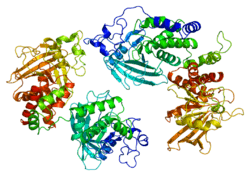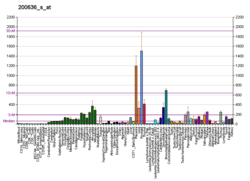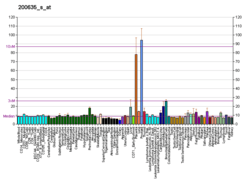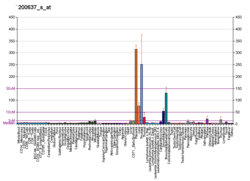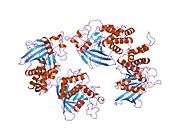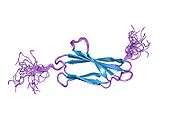PTPRF
Receptor-type tyrosine-protein phosphatase F is an enzyme that in humans is encoded by the PTPRF gene.[5][6]
The protein encoded by this gene is a member of the protein tyrosine phosphatase (PTP) family. PTPs are known to be signaling molecules that regulate a variety of cellular processes including cell growth, differentiation, mitotic cycle, and oncogenic transformation. This PTP possesses an extracellular region, a single transmembrane region, and two tandem intracytoplasmic catalytic domains, and thus represents a receptor-type PTP. The extracellular region contains three Ig-like domains, and nine non-Ig like domains similar to that of neural cell adhesion molecule. This PTP was shown to function in the regulation of epithelial cell–cell contacts at adherens junctions, as well as in the control of beta-catenin signaling. An increased expression level of this protein was found in the insulin-responsive tissue of obese, insulin-resistant individuals, and may contribute to the pathogenesis of insulin resistance. Two alternatively spliced transcript variants of this gene, which encode distinct proteins, have been reported.[6]
Interactions
PTPRF has been shown to interact with Beta-catenin[7][8] and liprin-alpha-1.[9][10][11]
References
- GRCh38: Ensembl release 89: ENSG00000142949 - Ensembl, May 2017
- GRCm38: Ensembl release 89: ENSMUSG00000033295 - Ensembl, May 2017
- "Human PubMed Reference:". National Center for Biotechnology Information, U.S. National Library of Medicine.
- "Mouse PubMed Reference:". National Center for Biotechnology Information, U.S. National Library of Medicine.
- Harder KW, Saw J, Miki N, Jirik F (Nov 1995). "Coexisting amplifications of the chromosome 1p32 genes (PTPRF and MYCL1) encoding protein tyrosine phosphatase LAR and L-myc in a small cell lung cancer line". Genomics. 27 (3): 552–3. doi:10.1006/geno.1995.1092. PMID 7558042.
- "Entrez Gene: PTPRF protein tyrosine phosphatase, receptor type, F".
- Bonvini P, An WG, Rosolen A, Nguyen P, Trepel J, Garcia de Herreros A, Dunach M, Neckers LM (Feb 2001). "Geldanamycin abrogates ErbB2 association with proteasome-resistant beta-catenin in melanoma cells, increases beta-catenin-E-cadherin association, and decreases beta-catenin-sensitive transcription". Cancer Res. 61 (4): 1671–7. PMID 11245482.
- Aicher B, Lerch MM, Müller T, Schilling J, Ullrich A (Aug 1997). "Cellular Redistribution of Protein Tyrosine Phosphatases LAR and PTPσ by Inducible Proteolytic Processing". J. Cell Biol. 138 (3): 681–96. doi:10.1083/jcb.138.3.681. PMC 2141638. PMID 9245795.
- Pulido R, Serra-Pagès C, Tang M, Streuli M (Dec 1995). "The LAR/PTP delta/PTP sigma subfamily of transmembrane protein-tyrosine-phosphatases: multiple human LAR, PTP delta, and PTP sigma isoforms are expressed in a tissue-specific manner and associate with the LAR-interacting protein LIP.1". Proc. Natl. Acad. Sci. U.S.A. 92 (25): 11686–90. doi:10.1073/pnas.92.25.11686. PMC 40467. PMID 8524829.
- Serra-Pagès C, Kedersha NL, Fazikas L, Medley Q, Debant A, Streuli M (Jun 1995). "The LAR transmembrane protein tyrosine phosphatase and a coiled-coil LAR-interacting protein co-localize at focal adhesions". EMBO J. 14 (12): 2827–38. doi:10.1002/j.1460-2075.1995.tb07282.x. PMC 398401. PMID 7796809.
- Serra-Pagès C, Medley QG, Tang M, Hart A, Streuli M (Jun 1998). "Liprins, a family of LAR transmembrane protein-tyrosine phosphatase-interacting proteins". J. Biol. Chem. 273 (25): 15611–20. doi:10.1074/jbc.273.25.15611. PMID 9624153.
Further reading
- Chernoff J (1999). "Protein tyrosine phosphatases as negative regulators of mitogenic signaling". J. Cell. Physiol. 180 (2): 173–81. doi:10.1002/(SICI)1097-4652(199908)180:2<173::AID-JCP5>3.0.CO;2-Y. PMID 10395287.
- Hashimoto N, Feener EP, Zhang WR, Goldstein BJ (1992). "Insulin receptor protein-tyrosine phosphatases. Leukocyte common antigen-related phosphatase rapidly deactivates the insulin receptor kinase by preferential dephosphorylation of the receptor regulatory domain". J. Biol. Chem. 267 (20): 13811–4. PMID 1321126.
- Jirik FR, Harder KW, Melhado IG, Anderson LL, Duncan AM (1993). "The gene for leukocyte antigen-related tyrosine phosphatase (LAR) is localized to human chromosome 1p32, a region frequently deleted in tumors of neuroectodermal origin". Cytogenet. Cell Genet. 61 (4): 266–8. doi:10.1159/000133418. PMID 1486801.
- Streuli M, Krueger NX, Thai T, Tang M, Saito H (1990). "Distinct functional roles of the two intracellular phosphatase like domains of the receptor-linked protein tyrosine phosphatases LCA and LAR". EMBO J. 9 (8): 2399–407. doi:10.1002/j.1460-2075.1990.tb07415.x. PMC 552264. PMID 1695146.
- Streuli M, Krueger NX, Tsai AY, Saito H (1989). "A family of receptor-linked protein tyrosine phosphatases in humans and Drosophila". Proc. Natl. Acad. Sci. U.S.A. 86 (22): 8698–702. doi:10.1073/pnas.86.22.8698. PMC 298355. PMID 2554325.
- Streuli M, Krueger NX, Hall LR, Schlossman SF, Saito H (1988). "A new member of the immunoglobulin superfamily that has a cytoplasmic region homologous to the leukocyte common antigen". J. Exp. Med. 168 (5): 1523–30. doi:10.1084/jem.168.5.1523. PMC 2189122. PMID 2972792.
- Schaapveld RQ, van den Maagdenberg AM, Schepens JT, Weghuis DO, Geurts van Kessel A, Wieringa B, Hendriks WJ (1995). "The mouse gene Ptprf encoding the leukocyte common antigen-related molecule LAR: cloning, characterization, and chromosomal localization". Genomics. 27 (1): 124–30. doi:10.1006/geno.1995.1014. hdl:2066/21329. PMID 7665159.
- Serra-Pagès C, Kedersha NL, Fazikas L, Medley Q, Debant A, Streuli M (1995). "The LAR transmembrane protein tyrosine phosphatase and a coiled-coil LAR-interacting protein co-localize at focal adhesions". EMBO J. 14 (12): 2827–38. doi:10.1002/j.1460-2075.1995.tb07282.x. PMC 398401. PMID 7796809.
- O'Grady P, Krueger NX, Streuli M, Saito H (1994). "Genomic organization of the human LAR protein tyrosine phosphatase gene and alternative splicing in the extracellular fibronectin type-III domains". J. Biol. Chem. 269 (40): 25193–9. PMID 7929208.
- Pulido R, Serra-Pagès C, Tang M, Streuli M (1996). "The LAR/PTP delta/PTP sigma subfamily of transmembrane protein-tyrosine-phosphatases: multiple human LAR, PTP delta, and PTP sigma isoforms are expressed in a tissue-specific manner and associate with the LAR-interacting protein LIP.1". Proc. Natl. Acad. Sci. U.S.A. 92 (25): 11686–90. doi:10.1073/pnas.92.25.11686. PMC 40467. PMID 8524829.
- Liu X, Vega QC, Decker RA, Pandey A, Worby CA, Dixon JE (1996). "Oncogenic RET receptors display different autophosphorylation sites and substrate binding specificities". J. Biol. Chem. 271 (10): 5309–12. doi:10.1074/jbc.271.10.5309. PMID 8621380.
- Debant A, Serra-Pagès C, Seipel K, O'Brien S, Tang M, Park SH, Streuli M (1996). "The multidomain protein Trio binds the LAR transmembrane tyrosine phosphatase, contains a protein kinase domain, and has separate rac-specific and rho-specific guanine nucleotide exchange factor domains". Proc. Natl. Acad. Sci. U.S.A. 93 (11): 5466–71. doi:10.1073/pnas.93.11.5466. PMC 39269. PMID 8643598.
- Zhang WR, Li PM, Oswald MA, Goldstein BJ (1996). "Modulation of insulin signal transduction by eutopic overexpression of the receptor-type protein-tyrosine phosphatase LAR". Mol. Endocrinol. 10 (5): 575–84. doi:10.1210/me.10.5.575. PMID 8732688.
- Tabiti K, Cui L, Chhatwal VJ, Moochhala S, Ngoi SS, Pallen CJ (1996). "Novel alternative splicing predicts a secreted extracellular isoform of the human receptor-like protein tyrosine phosphatase LAR". Gene. 175 (1–2): 7–13. doi:10.1016/0378-1119(96)00113-8. PMID 8917069.
- Ahmad F, Goldstein BJ (1997). "Functional association between the insulin receptor and the transmembrane protein-tyrosine phosphatase LAR in intact cells". J. Biol. Chem. 272 (1): 448–57. doi:10.1074/jbc.272.1.448. PMID 8995282.
- Aicher B, Lerch MM, Müller T, Schilling J, Ullrich A (1997). "Cellular Redistribution of Protein Tyrosine Phosphatases LAR and PTPσ by Inducible Proteolytic Processing". J. Cell Biol. 138 (3): 681–96. doi:10.1083/jcb.138.3.681. PMC 2141638. PMID 9245795.
- Serra-Pagès C, Medley QG, Tang M, Hart A, Streuli M (1998). "Liprins, a family of LAR transmembrane protein-tyrosine phosphatase-interacting proteins". J. Biol. Chem. 273 (25): 15611–20. doi:10.1074/jbc.273.25.15611. PMID 9624153.
- O'Grady P, Thai TC, Saito H (1998). "The Laminin–Nidogen Complex is a Ligand for a Specific Splice Isoform of the Transmembrane Protein Tyrosine Phosphatase LAR". J. Cell Biol. 141 (7): 1675–84. doi:10.1083/jcb.141.7.1675. PMC 2133008. PMID 9647658.
- Chiplunkar S, Chamblis K, Chwa M, Rosenberg S, Kenney MC, Brown DJ (1999). "Enhanced expression of a transmembrane phosphotyrosine phosphatase (LAR) in keratoconus cultures and corneas". Exp. Eye Res. 68 (3): 283–93. doi:10.1006/exer.1998.0604. PMID 10079136.
